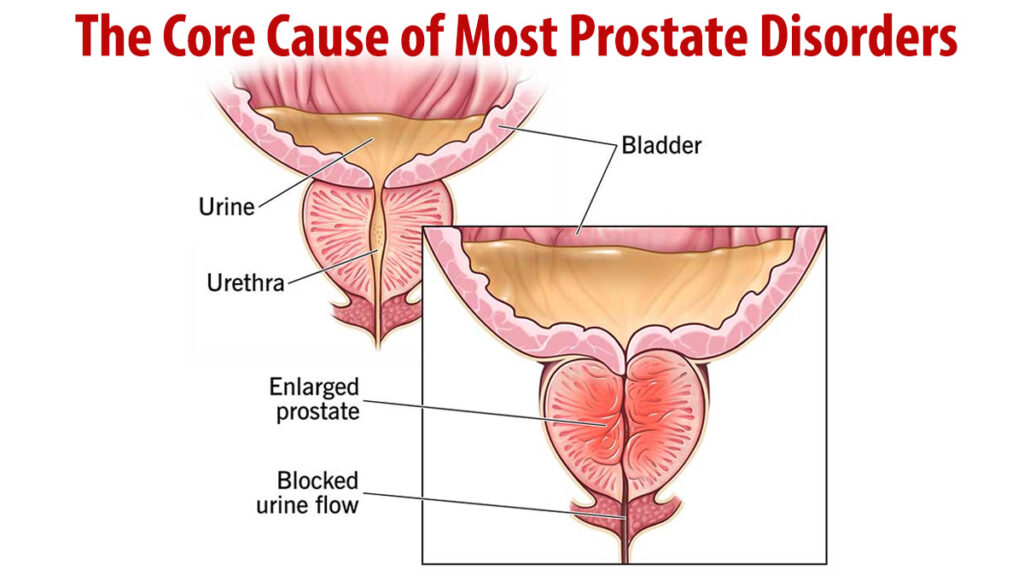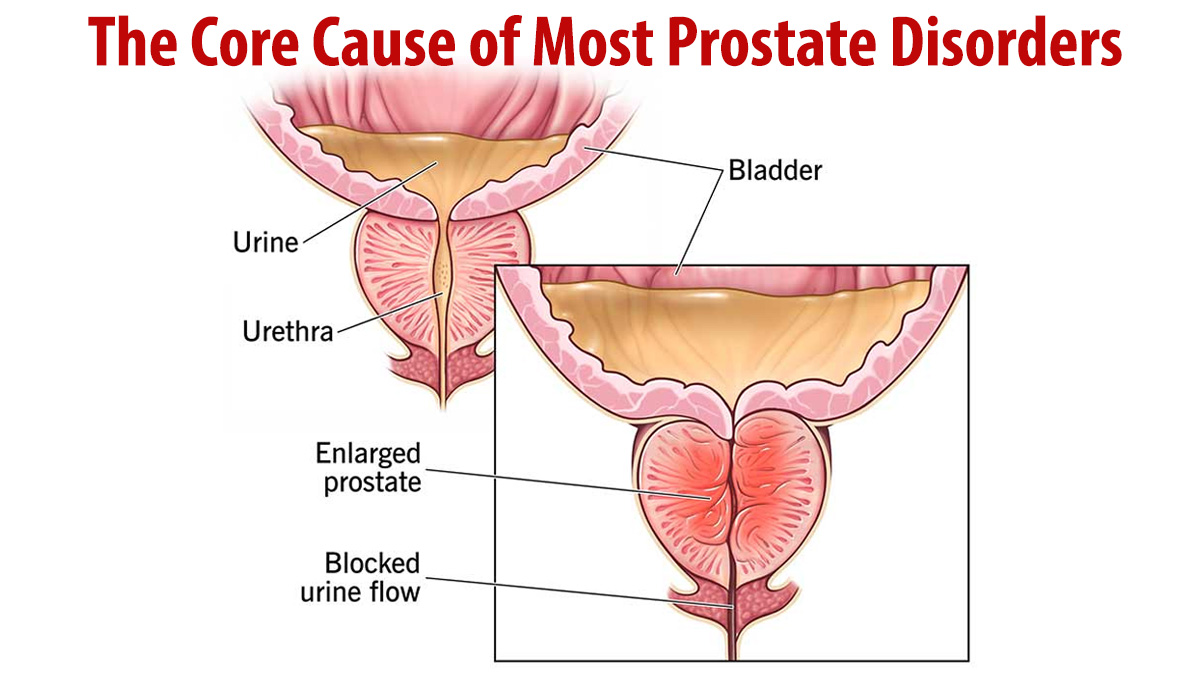Prostate cancer develops in the prostate, a small walnut-shaped gland that rests under the urinary bladder and in front of the lower rectum in men and people assigned male at birth (AMAB).
Many prostate cancers grow slowly and don’t cause any symptoms. These may be treated with active surveillance, which involves monitoring the cancer for signs that it is getting worse.
Genetics
The core cause of most prostate disorders is genetics, which means that the body has genes that can make it more likely to develop certain cancers. These genes control how your cells grow and divide. But if the gene is faulty, or misses a bit of information, it can allow some cells to grow out of control and turn into cancer.
Genetics can also be affected by lifestyle choices, such as diet and physical activity. Diet can affect how your hormone levels and inflammation are controlled, which may increase your risk for prostate cancer. You can reduce your risk by eating a healthy diet that limits saturated fats and sugar, processed meats, and alcohol.
Researchers are working to find the causes of prostate cancer that are hereditary and have been able to identify a number of potential genes. These include BRCA1 and BRCA2 (which are known to increase your risk of breast cancer), the mismatch repair genes, HOXB13, and others.
These genes and their variants have been linked to prostate cancer in genome-wide association studies (GWAS), linkage analyses, case-control studies, and admixture mapping. Men with inherited (germline) mutations in the BRCA1 or BRCA2 genes have an increased risk of prostate cancer and have more aggressive disease features. These men can be referred to clinical trials that aim to prevent their cancer from developing or recurrence.
In addition, men with germline variants in the mismatch repair genes have a higher risk of colon cancer. These genes are located on chromosomes 17 and 22. They are thought to help prevent errors in DNA repair, which is necessary for normal cell growth.
One of the most promising research projects is the African American Hereditary Prostate Cancer Project, which involves a collaboration between seven major cancer centers across the United States. This study will try to identify as many families as possible with a strong history of hereditary prostate cancer.
Men who have several relatives affected with prostate cancer should undergo a complete family history. This will determine the age of onset of prostate cancer in their family and whether or not they are at a greater than average risk for developing this disease. They should also participate in research studies if they are offered the opportunity to do so.
Diet
The core cause of most prostate disorders, including benign prostatic hyperplasia (BPH) and prostate cancer, is poor dietary habits. Men who eat diets containing too much meat, fat and saturated animal products, and not enough fruits, vegetables and whole grains are at increased risk of developing these conditions.
Eating a low-fat, plant-based diet is one of the most effective ways to lower your risk of developing prostate cancer. This plan emphasizes a variety of fresh, nutritious foods like fruits and vegetables, legumes, whole grains and lean proteins. It also limits sugary beverages and focuses on eating foods with natural fiber.
A high-fiber diet helps flush your body of the harmful toxins that can contribute to cancer development, such as uric acid and estrogen. It also reduces inflammation and boosts your immune system.
Fruits and vegetables contain antioxidants, such as lycopene, that help to slow down the growth of prostate cancer cells. These compounds also help to maintain normal prostate function and prevent enlarged prostates.
Cold-water fish like salmon, sardines and trout are rich in omega-3 fatty acids, which help to reduce inflammation. They also contain protein and calcium, which are essential for the maintenance of a healthy prostate gland.
Dairy foods, such as milk and cheese, are good sources of calcium. However, they raise your blood level of a protein called insulin-like growth factor-1 (IGF-1), which can increase your cancer risk.
A diet that is high in fiber from fruits, vegetables, nuts and seeds can reduce your risk of developing prostate cancer. In a study, men who ate a diet with more than 10 grams of fiber a day for 10 days showed changes in their serum levels that reduced their prostate cancer risks.
Nuts and seeds have high levels of antioxidants, which help to reduce the growth of prostate cancer cells. These include pumpkin seeds, sesame seeds, Brazil nuts and almonds. They are especially helpful if you have BPH.
Other foods that can improve your prostate health include cooked tomatoes, berries and garlic. They are all high in antioxidants and sulforaphane, which may help to prevent prostate cancer. They are also a great source of vitamin C, which can help to protect your prostate.
Physical Activity
The core cause of most prostate disorders is not inherited genetics, but rather exposure to some stimulus (such as chemicals, radiation or inflammation). This can result in mutations in cells’ DNA, which then cause the cancer.
Some people are at increased risk of developing prostate problems as they get older. These include men with a family history of the disease, people who eat a diet high in red meat and saturated fats, and people who have a condition called prostatic enlargement, or benign prostatic hyperplasia (BPH).
Most prostate problems are caused by an enlarged prostate gland that squeezes the urethra, causing difficulty passing urine. These symptoms can occur at any age, but they are more common in men in their 60s and 70s.
These symptoms can also happen due to an infection or a tumor that causes the prostate gland to become larger. They can also occur as a side effect of other treatments or medications.
If you have BPH, your doctor may recommend a special medication to reduce the size of the gland and treat any other symptoms that you might have. Your doctor may also suggest an ultrasound.
An ultrasound can show the size and shape of your prostate. It can help your doctor determine whether a biopsy is needed.
A doctor can perform a biopsy by inserting a small needle into your prostate gland. The biopsy can detect cancer.
Most men with low-risk, non-aggressive prostate cancers don’t experience any symptoms at all. The cancer is usually not diagnosed until the cancer has spread to the bone or lymph nodes.
Your provider may start you on active surveillance if you have prostate cancer that’s growing slowly and not causing you any problems. This means getting screenings, scans and biopsies every one to three years to monitor the growth of your prostate.
You might want to try some aerobic exercises, such as walking, jogging or cycling. These can help you burn calories, strengthen your heart and lungs, and improve your mood. Exercise can also boost your energy levels, making it easier to work long hours or keep up with household chores.
Stress
Stress is the body’s reaction to harmful situations — whether they’re real or perceived. It triggers your “fight-or-flight” response, which includes increased heart rate and breathing, muscle tension, and blood pressure.
Everyone experiences some stress in their life. This can be from major life changes, a difficult relationship, job or school problems, or health issues.
But how you react to stress depends on how much you believe that you have control over your situation. Some people are able to cope with stress better than others and can take it in stride, even when it feels overwhelming.
During the fight-or-flight response, your body releases two main stress hormones, cortisol and adrenaline. These hormones help your body prepare for action, and they also increase glucose (sugar) in your bloodstream to support brain and muscle repair functions.
However, prolonged periods of high stress can lead to negative effects on your physical and mental health. These effects include problems sleeping, irritability, loss of appetite, and difficulty concentrating.
If you’re experiencing symptoms of stress, talk to your doctor. He or she can help you figure out the causes of your stress, discuss self-care strategies, and help you find solutions.
Your doctor can also check if you have other conditions that may be causing your stress-related symptoms, such as depression or anxiety. They can also check your medical history and test your urine for any other potential causes.
You can relieve your stress by avoiding things that cause it or by taking active steps to reduce it. These can include changing your work schedule, making time for hobbies or interests, and spending quality time with family or friends.
But if you’re finding that you can’t control your stress, see a counselor or therapist. This can help you learn new coping skills, identify sources of your stress and make positive lifestyle choices to prevent it from recurring.
Your doctor will also check if you have any other health problems, such as diabetes, high blood pressure, heart disease or other problems that might be linked to stress. If you have any of these, he or she can prescribe medication or other treatment.


